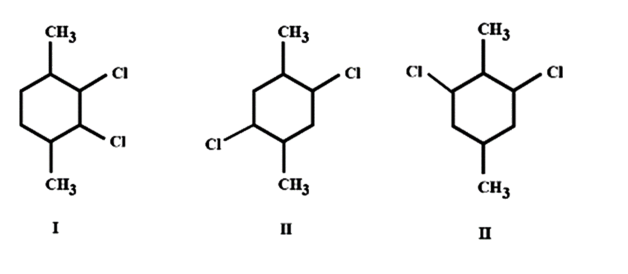which of the following will have the highest coagulating power for Fe(OH)3 colloid ?
PO3−4
SO2−4
Ca2+
Al3+
The correct Answer is:a
To determine which of the given options has the highest coagulating power for the Fe(OH)3 colloid, we need to analyze the charge of each species provided in the options and apply Hardy-Schulze's rule.
1. Identify the Charge of Fe(OH)3 Colloid:
- Ferric hydroxide, Fe(OH)3, is a positively charged colloid. This means that it will coagulate in the presence of negatively charged ions.
2. List the Given Options:
- Option 1: Phosphate anion (PO4^3-)
- Option 2: Sulfate anion (SO4^2-)
- Option 3: Calcium cation (Ca^2+)
- Option 4: Aluminum cation (Al^3+)
3. Determine the Charge of Each Option:
- Phosphate (PO4^3-) has a charge of -3.
- Sulfate (SO4^2-) has a charge of -2.
- Calcium (Ca^2+) has a charge of +2.
- Aluminum (Al^3+) has a charge of +3.
4. Apply Hardy-Schulze's Rule:
- According to Hardy-Schulze's rule, the coagulating power of an ion is directly proportional to the charge of the ion. The higher the charge, the greater the coagulating power.
- Since Fe(OH)3 is positively charged, we are interested in the negatively charged ions for coagulation.
5. Compare the Charges of Negatively Charged Ions:
- Phosphate (PO4^3-) has a charge of -3.
- Sulfate (SO4^2-) has a charge of -2.
- The other two options (Calcium and Aluminum) are positively charged and do not contribute to the coagulation of the positively charged Fe(OH)3.
6. Conclusion:
- Since phosphate (PO4^3-) has the highest negative charge (-3) compared to sulfate (SO4^2-) (-2), it will have the highest coagulating power for Fe(OH)3 colloid.
Final Answer:
Phosphate anion (PO4^3-) will have the highest coagulating power for Fe(OH)3 colloid.
- Ferric hydroxide, Fe(OH)3, is a positively charged colloid. This means that it will coagulate in the presence of negatively charged ions.
- Option 1: Phosphate anion (PO4^3-)
- Option 2: Sulfate anion (SO4^2-)
- Option 3: Calcium cation (Ca^2+)
- Option 4: Aluminum cation (Al^3+)
- Phosphate (PO4^3-) has a charge of -3.
- Sulfate (SO4^2-) has a charge of -2.
- Calcium (Ca^2+) has a charge of +2.
- Aluminum (Al^3+) has a charge of +3.
- According to Hardy-Schulze's rule, the coagulating power of an ion is directly proportional to the charge of the ion. The higher the charge, the greater the coagulating power.
- Since Fe(OH)3 is positively charged, we are interested in the negatively charged ions for coagulation.
- Phosphate (PO4^3-) has a charge of -3.
- Sulfate (SO4^2-) has a charge of -2.
- The other two options (Calcium and Aluminum) are positively charged and do not contribute to the coagulation of the positively charged Fe(OH)3.
- Since phosphate (PO4^3-) has the highest negative charge (-3) compared to sulfate (SO4^2-) (-2), it will have the highest coagulating power for Fe(OH)3 colloid.
Phosphate anion (PO4^3-) will have the highest coagulating power for Fe(OH)3 colloid.
Similar Questions
Knowledge Check
Which of the following has highest coagulating power for As2S3 sol ?
ASO2−4BAI3+CPO3−4DK+Which of the following compounds will have highest melting point?
AChlorobenzeneBo-DichlorobenzeneCm-DichlorobenzeneDp-Dichlorobenzene
Which of the following will have highest hydration energy ?
View SolutionWhich of the following will have highest bond energy ?
View SolutionWhich of the following have highest bond angle ? .
View SolutionWhich of the following solution will have highest boiling point ?
View SolutionWhich of the following ion has the highest coagulation power for the sol. Which is obtained by the following reaction?
FeCl3(excess)+NaOH→Sol
View SolutionWhich of the following compounds will have highest melting point ?

View Solution
